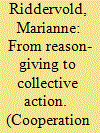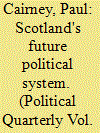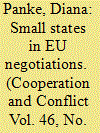| Srl | Item |
| 1 |
ID:
110773


|
|
|
|
|
| Publication |
2011.
|
| Summary/Abstract |
The aim of this article is to contribute to the further development of deliberative theory-to make it more applicable to research on EU integration-by establishing alternative and more concise micro-mechanisms to those of the rationalist bargaining perspectives. It is suggested that the micro-mechanism through which deliberation has an effect on outcomes is what is termed argument-based learning, which means that an actor accepts the validity of a presented argument so that (s)he acts upon it. Moreover, the article differentiates between three types of argument-based learning considered relevant in the EU context. On this basis, it suggests a two-step analytical approach for studies of EU decision-making processes. In trying out the empirical relevance of the framework, it is applied to a case where one would not expect agreements on common EU policies to have been reached due to argument-based learning, namely EU coordination towards the Maritime Labour Convention (MLC). The framework proved helpful in accounting for agreements that are puzzling from a rationalist perspective.
|
|
|
|
|
|
|
|
|
|
|
|
|
|
|
|
| 2 |
ID:
107496


|
|
|
|
|
| Publication |
2011.
|
| Summary/Abstract |
Despite recent progress, the production costs for renewable electricity remain above those for conventional power. Expectations of continuous reductions in production costs, typically underpin governments' policies for financial support. They often draw on the technology-focused versions of the Experience Curve model. This paper discusses how national-contextual factors also have a strong influence on production costs, such as geographic, infrastructural, institutional, and resource factors. As technologies mature, and as they reach significant levels of diffusion nationally, sustained increases in production costs might be recorded, due to these nationally contextual factors, poorly accounted for in policy-making decisions for price support. The paper suggests an analytical framework for a more comprehensive understanding of production costs. Based on this, it recommends that the evolution of specific cost levels and factors be monitored to locate 'sources of changes'. The paper also suggests policy instruments that governments may use to facilitate cost decreases, whenever possible. The application of the framework is illustrated for the diffusion of wind power in Spain during the past three decades.
|
|
|
|
|
|
|
|
|
|
|
|
|
|
|
|
| 3 |
ID:
091633


|
|
|
|
|
| Publication |
2009.
|
| Summary/Abstract |
The American decision to deploy missile defence in Poland endangered the central myth of Putin's regime (Russia's rebirth as a Great Power), challenged the status of Putin as Russia's strongman, and introduced an additional uncertainty into the carefully scripted campaign for succession to Putin. It also hit the raw nerve of Russia's reliance on nuclear weapons. The character of Russian policy-making has guaranteed the worst-case scenario evaluation of the American programme. The Russian elite's world view has magnified the problems resulting from the deployment into fears of a window of vulnerability.
|
|
|
|
|
|
|
|
|
|
|
|
|
|
|
|
| 4 |
ID:
138878


|
|
|
|
|
| Summary/Abstract |
Debates on Scottish constitutional reform go hand in hand with discussions of political reform. Its reformers use the image of ‘old Westminster’ to describe ‘control freakery’ within government and an adversarial political system. Many thought that the Scottish political system could diverge from the UK, to strengthen the parliamentary system, introduce consensus politics and further Scotland's alleged social and democratic tradition. Yet the experience of devolution suggests that Holyrood and Westminster politics share key features. Both systems are driven by government, making policy in ‘communities’ involving interest groups and governing bodies, with parliaments performing a limited role and public participation limited largely to elections. The Scottish government's style of policy-making is distinctive, but new reforms are in their infancy and their effects have not been examined in depth. In this context, the article identifies Scotland's ability to make and implement policy in a new way, based on its current trajectory rather than the hopes of reformers.
|
|
|
|
|
|
|
|
|
|
|
|
|
|
|
|
| 5 |
ID:
138433


|
|
|
|
|
| Summary/Abstract |
The decision-making surrounding the deployment of UK forces to southern Afghanistan in 2005–06 remains a matter of heated debate. In this personal recollection, Ed Butler, who led the British Task Force from mid-2005, highlights what he thinks were the shortcomings of policy-making and leadership within the political and military spheres during that time.
|
|
|
|
|
|
|
|
|
|
|
|
|
|
|
|
| 6 |
ID:
105954


|
|
|
|
|
| Publication |
2011.
|
| Summary/Abstract |
Based on a comprehensive survey conducted in 2009, this article analyses similarities and differences in the policy-shaping activities of all 27 European Union member states in the day-to-day policy-making process of the EU. It shows that some states participate more actively in EU working parties and the COREPER than others. Do bigger states use negotiation strategies more frequently than smaller states? Do the available capacities crucially influence how frequently a delegation employs negotiation strategies in a particular policy field? The article develops a set of willingness- and capacity-related hypotheses and tests them using qualitative and quantitative methods. It shows that small states can surmount size-related difficulties most importantly through the accumulation of expertise. Thus, size is what states make of it. Small states are neither per se political dwarfs nor power-brokers.
|
|
|
|
|
|
|
|
|
|
|
|
|
|
|
|